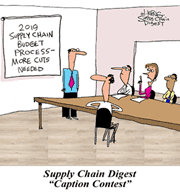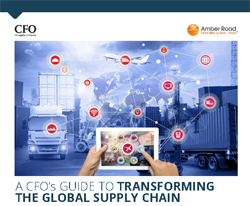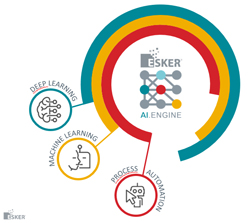Highlights of the Annual 3PL Study
For the 23rd consecutive year, my friend Dr. John Langley of Penn State University has led the annual Third Party Logistics Study, released again this year at the CSCMP conference in Nashville about one month ago, a collaboration between Langley/Penn State and again this year Penske Logistics, recruiting firm Korn Ferry and consultancy Infosys.
Since I knew I could get a copy of the report later I didn't attend the CSCMP presentation, but I did duck my head into the large session room and it was packed as is it is every CSCMP. The interest in logistics outsourcing obviously remains high, and nothing pulls the current situation together like this study.
| GILMORE SAYS: |
I also believe that many 3PLs that have deployed modern technologies often do not fully use those capabilities or present them in a way most convincing to shippers.
WHAT DO YOU SAY?
Send us your
Feedback here
|
The report is based in part on survey responses from 650 shippers and 3PLs worldwide - up 10% from last year. 38% of those were 3PLs/4PLs, 46% were shippers that use 3PLs, and 16% were shippers that do not use 3PLs - valued for their perspective on why they don't outsource any aspect of logistics.
This year 67% of respondents were from North America, with 13% from Asia and just 9% from Europe. I will say there seems to be some conscious effort this year to position the report as a more global view than has been the case in the past.
That said, in some years past there were instances that segmented responses to various survey questions by geography, so you could see the perspective of say North American versus Europe and Asia. That is no longer the case, I suspect in part because of the dominance of NA respondents and also the space needed to display the data that way. It's easier to aggregate the data across geographies than break it out.
As has been the case for many years, the report again this year focuses on a set of questions and related discussion across a set of issues that mostly stay the same every year (e.g., the famous "IT Gap" - see below), along with a new set of focus topics for this year that get some discussion and usually some survey support.
In this year's report, those focus topics include: keeping the supply chain alive and nimble; the "last yard"; omnichannel revisited; dealing with disruption; and shipper-3PL data sharing. We'll focus here today on the main general data points and insights, and visit the specialty topics next time.
The report found total logistics expenditures as a percentage of sales revenue was the same 11% in the 2018 responses as in the 2017 results, versus 10% in 2016. That seems surprising, given that most measures and anecdotal stories from many companies indicate that logistics costs were up substantially in the last year.
Over the same time frame, the percentage of shippers' transportation spend managed by 3PLs somehow decreased to 50% this year versus 55% the year before, while the percentage of shippers' warehousing spend managed by 3PLs decreased to 34% from 39%.
It is hard to know if those declines are real or just the types of statistical aberrations that can occur in survey results in any given year. Worth watching over time.
The report summarizes data from Armstrong & Associates on global 3PL revenues, which of course are driven directly by shipper spend with 3PLs. From 2010-17 - notably starting after the Great Recession - global 3PL revenues have grown a decent 3.5% annually (dragged down oddly by negative growth rates in Europe) and I will note that is very close to global GDP growth over the period, so 3PL market share would seem to be flat over the period.
But in North America, that annual 3PL growth rate has been a more robust 4.6%, well above GDP growth of around 2%, indicating 3PLs are gaining in the share of logistics spend. See the graphic from the report below:
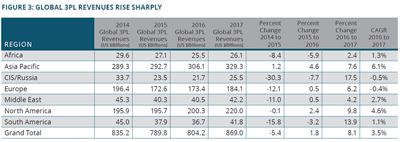
Source: 2019 3PL Study
See Full Image
Other survey data highlights include:
• 63% of shippers indicate they are increasing their use of outsourced logistics services this year, up a bit from 61% last year. Conversely, 28% of shippers indicate again this year that they are returning to insourcing many of their logistics activities, same as in 2017.
These percentages seem to in general stay remarkably flat year after year.
• 61% of 3PL users report reducing or consolidating the number of 3PLs they use, up markedly from 53% reported last year. This trend is probably both a reflection of an interest in reducing the 3PLs a company has to manage, and the great consolidation that has occurred in the 3PL sector itself, which becomes a self-fulfilling prophecy of shipper 3PL consolidation.
• 91% of shippers report their relationships with 3PLs generally have been successful, flat with last year and obviously a very high number.
• 73% of 3PL users say that 3PLs provide new and innovative ways to improve logistics effectiveness (same as last year), versus a higher 91% of 3PL which believe they are providing that value. Draw your own conclusions.
• Here's an interesting one: 41% of shippers believe that companies like themselves are collaborating with other companies, even competitors, to achieve logistics cost and service improvements. More than double that percentage (86%) of 3PLs believe that is the case. Why the discrepancy, I wonder?
SCDigest is always interested in the dreaded "IT Gap," which the report has been following for many years. That gap refers to the percentage difference between how shippers place 3PL IT capabilities in terms importance (always very high, usually in the low 90s in terms of percentage), versus their view of actual 3PL IT capabilities, always much lower a score.
For years the IT Gap had been shrinking, but for reasons that are unclear, it spiked back up in last year's data, where it stayed again this year, as shown in the graphic below. 93% of shippers believe 3PL IT capabilities are a very important factor in success, while only 55% are satisfied with those capabilities.
The report says that "Overall, the IT gap appears to have stabilized somewhat in recent years. This observation deserves further attention, as it has been apparent for some time that 3PLs have increased their IT capabilities while shippers have become more proficient buyers of IT-related services."
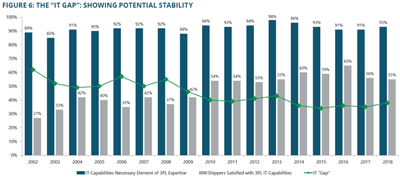
Source: 2019 3PL Study
See Full Image
My view: some 3PLs still try to get by with aging, often home-grown technology that is simply far out of date. There is some complexity here, because if in the middle of a contract with a given shipper or multiple shippers, introducing new technology raises some issues. Even the shipper may not want to upset the apple cart.
But I also believe that many 3PLs that have deployed modern technologies often do not fully use those capabilities or present them in a way most convincing to shippers.
I am out of space. The full report available for free download with registration here.
A look at the focus issues next week discussed this important research report.
Any reaction to this data from the 3PL report? Let us know your thoughts at the Feedback button below. |



![]()

![]()

![]()



